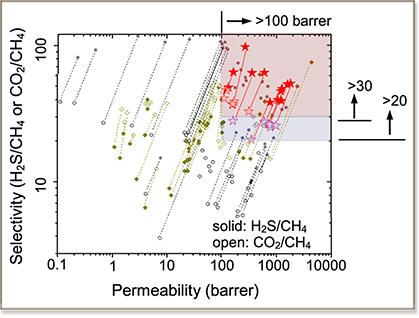

Journal of Membrane Science
Volumn 627, June 2021, 119201
Membranes are attractive for upgrading natural gas; however, the gas permeation processes through membranes are challenging to control. The coexistence of condensable H2S and CO2 typically causes membrane performance to decline under practical feed conditions, due to uncontrolled penetrant competition and undesired plasticization of the membrane polymer matrix. In this paper, we report a strategy to successfully transform these apparent negatives, i.e. plasticization and penetrant competition, into positives that boost the natural gas sweetening efficiency of membranes greatly. Our strategy is to disperse engineered metal organic framework (MOF) fillers into designed polymer matrices to form hybrid membranes, which promote the permeation of both H2S and CO2 but hinder CH4 permeation. Moreover, uniformly dispersed MOF fillers also significantly alter the plasticization responses of polymer matrices, enabling controlled plasticization benefits. Ultimately, we illustrate a highly tunable MOF-polymer hybrid membrane platform that meets the diverse natural gas sweetening requirements under aggressive conditions.
